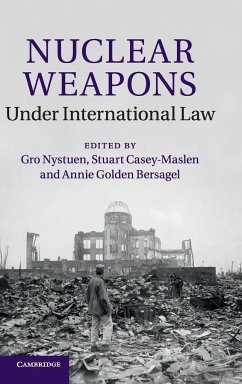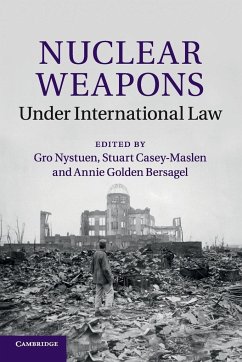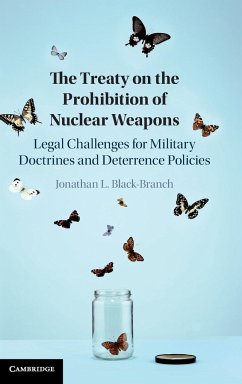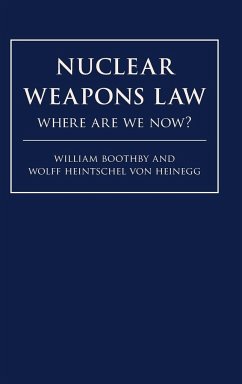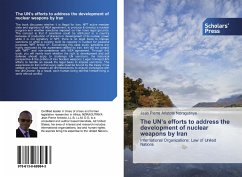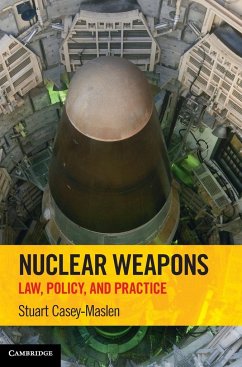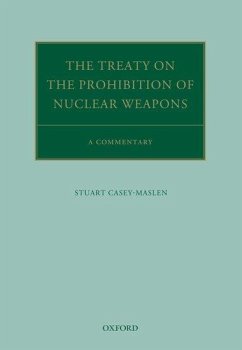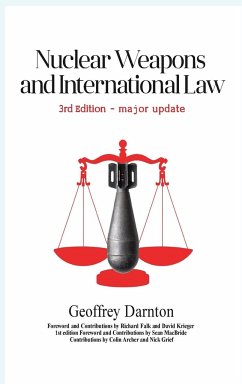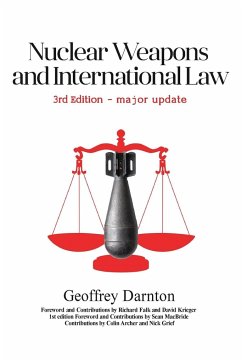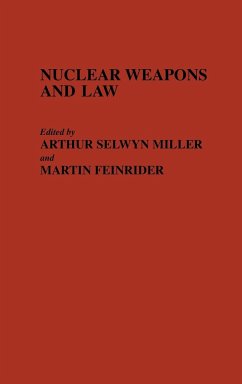
International Law, the International Court of Justice and Nuclear Weapons

PAYBACK Punkte
78 °P sammeln!
The legality of nuclear weapons has been strongly questioned in recent years, particularly by the developing countries and non-governmental organisations. Their concern found expression in the requests by the World Health Organisation and the United Nations General Assembly to the International Court of Justice to pronounce on the legality of their use. On 8 July 1996, the Court handed down two Advisory Opinions; these are the first authoritative international judicial opinions since the development of nuclear weapons in the 1940s. This book offers a comprehensive study of the opinions. More t...
The legality of nuclear weapons has been strongly questioned in recent years, particularly by the developing countries and non-governmental organisations. Their concern found expression in the requests by the World Health Organisation and the United Nations General Assembly to the International Court of Justice to pronounce on the legality of their use. On 8 July 1996, the Court handed down two Advisory Opinions; these are the first authoritative international judicial opinions since the development of nuclear weapons in the 1940s. This book offers a comprehensive study of the opinions. More than thirty internationally respected experts contribute their analyses of the status of nuclear weapons in international law across all its sectors: use of force, humanitarian law, environment and human rights. The contributions also assess the implications of the opinions for international organisations and the international judicial function. Contributors include lawyers, academics, diplomats and advisors to international bodies.
Table of contents:
Introduction Laurence Boisson de Chazournes and Philippe Sands; Part I. Actors, Institutions and the International Court of Justice: 1. Who are the addressees of the Opinions? - Quels sont les destinataires des avis? Jean Salmon; 2. On discretion: reflections on the nature of the consultative function of the International Court of Jusitce Georges Abi-Saab; 3. ET and the ICJ: reflections of an extraterrestrial on the two Advisory Opinions - E.T. à la Cour Internationale de Justice: méditations d'un extra-terrestre sur deux avis consultatifs Jean-Pierre Queneudec; 4. The jurisdiction and merits phases distinguished Gavan Griffith and Chris Staker; 5. Reflections on the principle of speciality revisited and the 'politicisation' of the specialised agencies - Quelques réflexions sur le principe de spécialité et la 'politisation' des institutions spéciliasées Pierre Klein; 6. Judicial review of the acts of international organisations Elihu Lauterpacht; 7. The WHO request Michael Bothe; 8. The WHO case: implications for specialised agencies Virginia Leary; Part II: Substantive Aspects: 9. The Lotus and the double structure of international legal argument Ole Spiermann; 10. Non liquet and the incompleteness of international law Daniel Bodansky; 11. Treaty and custom Roger Clark; 12. Nuclear weapons and the concept of jus cogens: pre-emptory norms and justice pre-empted? Jake Werksman and Ruth Khalastchi; 13. The question of the law of neutrality - La question du droit de la neutralité Christian Dominicé; 14. The status of nuclear weapons in the light of the Court's opinion of 8 July 1996 - Le statut des armes nucléaires à la lumiére de l'Avis de la CIJ du 8 juillet 1996 Eric David; 15. International humanitarian law, or the exploration by the Court of a terra somewhat incognita -Le droit international humanitaire, où de l'exploration par la cour d'une terra à peu près incognita pour elle Luigi Condorelli; 16. Jus ad bellum and jus in bello in the Nuclear Weapons Advisory Opinion Christopher Greenwood; 17. On the relationship between jus ad bellum and jus in bello in the General Assembly Advisory Opinion Rein Müllerson; 18. Necessity and proportionality in jus ad bellum and jus in bello Judith Gardam; 19. The notion of 'state survival' in international law Marcelo G. Kohen; 20. The right to life and genocide: the Court and international public policy Vera Gowlland-Debbas; 21. Opening the door to the environment and to future generations Edith Brown Weiss; 22. The use of nuclear weapons and the protection of the environment - Le recours a l'arme nucléaire et la protection de l'environnement: l'apport de la cour internationale de justice Djamchild Momtaz; 23. The Non-Proliferation Treaty and its future Miguel Marin Bosch; 24. The Nuclear Weapons Advisory Opinions: The declarations and separate and dissenting opinions Hugh Thirlway; 25. The perspective of Japanese international lawyers Yasuhiro Shigeta; Part III. The Opinions in their Broader Context: 26. Between the individual and the state: international law at a crossroads? Pierre-Marie Dupuy; 27. The nuclear weapons case David Kennedy; 28. The political consequences of the Nuclear Weapons Advisory Opinion W. Michael Reisman; 29. The silence of the law/the voice of justice: reflections on the International Court of Justice Martti Koskenniemi; 30. Fairness and the General Assembly Advisory Opinion Thomas M. Franck.
On 8 July 1996 the International Court of Justice handed down two Advisory Opinions on the legality of nuclear weapons. Over thirty internationally respected experts contribute their analyses of the status of nuclear weapons in international law across all its sectors: use of force, humanitarian law, environment and human rights.
Most comprehensive book analysing the ICJ Advisory Opinions on nuclear weapons handed down in 1996.
Table of contents:
Introduction Laurence Boisson de Chazournes and Philippe Sands; Part I. Actors, Institutions and the International Court of Justice: 1. Who are the addressees of the Opinions? - Quels sont les destinataires des avis? Jean Salmon; 2. On discretion: reflections on the nature of the consultative function of the International Court of Jusitce Georges Abi-Saab; 3. ET and the ICJ: reflections of an extraterrestrial on the two Advisory Opinions - E.T. à la Cour Internationale de Justice: méditations d'un extra-terrestre sur deux avis consultatifs Jean-Pierre Queneudec; 4. The jurisdiction and merits phases distinguished Gavan Griffith and Chris Staker; 5. Reflections on the principle of speciality revisited and the 'politicisation' of the specialised agencies - Quelques réflexions sur le principe de spécialité et la 'politisation' des institutions spéciliasées Pierre Klein; 6. Judicial review of the acts of international organisations Elihu Lauterpacht; 7. The WHO request Michael Bothe; 8. The WHO case: implications for specialised agencies Virginia Leary; Part II: Substantive Aspects: 9. The Lotus and the double structure of international legal argument Ole Spiermann; 10. Non liquet and the incompleteness of international law Daniel Bodansky; 11. Treaty and custom Roger Clark; 12. Nuclear weapons and the concept of jus cogens: pre-emptory norms and justice pre-empted? Jake Werksman and Ruth Khalastchi; 13. The question of the law of neutrality - La question du droit de la neutralité Christian Dominicé; 14. The status of nuclear weapons in the light of the Court's opinion of 8 July 1996 - Le statut des armes nucléaires à la lumiére de l'Avis de la CIJ du 8 juillet 1996 Eric David; 15. International humanitarian law, or the exploration by the Court of a terra somewhat incognita -Le droit international humanitaire, où de l'exploration par la cour d'une terra à peu près incognita pour elle Luigi Condorelli; 16. Jus ad bellum and jus in bello in the Nuclear Weapons Advisory Opinion Christopher Greenwood; 17. On the relationship between jus ad bellum and jus in bello in the General Assembly Advisory Opinion Rein Müllerson; 18. Necessity and proportionality in jus ad bellum and jus in bello Judith Gardam; 19. The notion of 'state survival' in international law Marcelo G. Kohen; 20. The right to life and genocide: the Court and international public policy Vera Gowlland-Debbas; 21. Opening the door to the environment and to future generations Edith Brown Weiss; 22. The use of nuclear weapons and the protection of the environment - Le recours a l'arme nucléaire et la protection de l'environnement: l'apport de la cour internationale de justice Djamchild Momtaz; 23. The Non-Proliferation Treaty and its future Miguel Marin Bosch; 24. The Nuclear Weapons Advisory Opinions: The declarations and separate and dissenting opinions Hugh Thirlway; 25. The perspective of Japanese international lawyers Yasuhiro Shigeta; Part III. The Opinions in their Broader Context: 26. Between the individual and the state: international law at a crossroads? Pierre-Marie Dupuy; 27. The nuclear weapons case David Kennedy; 28. The political consequences of the Nuclear Weapons Advisory Opinion W. Michael Reisman; 29. The silence of the law/the voice of justice: reflections on the International Court of Justice Martti Koskenniemi; 30. Fairness and the General Assembly Advisory Opinion Thomas M. Franck.
On 8 July 1996 the International Court of Justice handed down two Advisory Opinions on the legality of nuclear weapons. Over thirty internationally respected experts contribute their analyses of the status of nuclear weapons in international law across all its sectors: use of force, humanitarian law, environment and human rights.
Most comprehensive book analysing the ICJ Advisory Opinions on nuclear weapons handed down in 1996.





